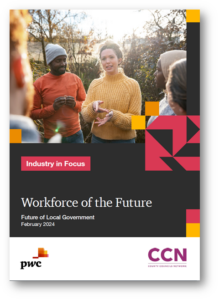
CCN Latest News, CCN News 2024 | 05 February 2024

The research by the County Councils Network (CCN), carried out by PwC, Workforce of the Future, shows that workforce capacity is ‘one of the biggest challenges’ facing local government in England, worsened by over a decade of funding challenges and exacerbated in recent years by post-pandemic trends.
 The report contains a new survey, of over 6,000 staff working in county and unitary councils across different council departments, outlining how they feel about working in local government, their motivations for joining the workforce, and their career prospects.
The report contains a new survey, of over 6,000 staff working in county and unitary councils across different council departments, outlining how they feel about working in local government, their motivations for joining the workforce, and their career prospects.
The survey reveals that just one in four employees anticipate staying in local government for a short period of time, and highlights ‘negative perceptions’ and ‘misconceptions’ over how the sector is perceived to potential new recruits.
These findings come as the report reveals that the local government workforce has reduced by over half a million since 2012, with councils in county and rural areas witnessing the largest decline.
Download the report here.
The report was launched at a webinar, which you can watch below. The event’s expert panel included Hertfordshire County Council chief executive Owen Mapley, Buckinghamshire Council’s chief executive Rachael Shimmin, as well as PwC’s Paul Deegan and Erica Ballmann.
Over 100 people tuned into the webinar, as the panel dissected the report’s key findings. Watch it back below.
Workforce of the Future aims to set out solutions to address the staffing shortfall within local government and identifies a number of challenges that will need to be addressed by the local government sector, including:
Despite the good work of individual councils locally, the report identifies a lack of understanding and misconceptions on the breadth of opportunities a career in local government offers as key barriers to recruiting new entries into the sector.
The report proposes a sector-led effort to create a positive national branding campaign for local government, similar to other public sector organisations, to help put local government at the forefront of the minds of individuals in the labour market and overcome negative perceptions of working within the sector. There have been recent moves in this direction, with the Local Government Association currently piloting a regional recruitment campaign in the North East.
With just 4.6% of the current local government workforce aged under 25, and with the survey showing over one in four (28%) of staff aged between 18-34 only plan on working in local government for less than four years, the report says that providing more reasons for young people to stay in the sector is critical.
To do so, the report recommends ‘career development cycles’ to help showcase the wide range of opportunities for individuals in their areas. This would entail councils expanding their focus beyond traditional graduate schemes and improving relationships with local education partners – schools, colleges, and universities – to highlight the breadth of careers within the local government sector.
To help address concerns over training, career development, and secondment opportunities, the report finds that local leaders have a lack of further education levers to pull at a local level. It calls for greater devolution of skills and education powers and budgets, which could give councils a greater ability to influence the skills needed in their areas and offer more training and career progression opportunities, as well as the ability for greater partnership working with further education colleges.
 Cllr Tim Oliver, Chairman of the County Councils Network, said:
Cllr Tim Oliver, Chairman of the County Councils Network, said:
“For many years now, local government has grappled with a workforce crisis in virtually all departments, a trend which has worsened due to various shocks over the last four years, including the pandemic, cost-of-living pressures and high economic inactivity. The demographics aren’t on our side: less than 5% of workers are under 25, and over one in four under 35s do not plan on staying in the sector beyond four years.
“Today’s report and survey is a useful temperature check on how our workforce feels about the sector, and what could drive them to continue their careers in local government. It is pleasing that so many workers have a passion for public service delivery, and almost three quarters of employees would recommend working in the sector. But it also highlights negative perceptions of working within local government and too many workers do not feel they will get the skills training they need, whilst others showed a clear desire for career progression.
“If we are to recruit and retain workers then we need a new national brand for local government. This should mirror how the NHS has put itself at the forefront of peoples’ minds as a potential employer and tackle negative perceptions of what councils do. The report also sets out further solutions to ease the workforce crisis, including career development cycles, expanding our partnerships with local schools, colleges, and universities to recruit the workers of tomorrow, alongside greater devolution of skills and employment responsibilities to a local level.”
 Paul Deegan, Lead Partner for Local Public Services and Health Industries at PwC, said:
Paul Deegan, Lead Partner for Local Public Services and Health Industries at PwC, said:
“There’s no escaping the unique workforce challenges facing local government which need addressing to adopt new, sustainable workforce models to develop a workforce fit for the future.
“Whilst we are seeing some action within the sector to address the challenges, our research demonstrates there is still more fundamental change to be delivered. How the sector harnesses its collective effort and thinking to promote careers in local government, particularly to younger generations, will be critical to future-proofing the local government workforce and attracting the number of future recruits needed. There is a real opportunity to capture the appetite amongst young people wanting to make a positive impact on society and how this aligns to the role and values of local government operating in local communities where people live and work.”
 Owen Mapley, Vice-Chair of the Association of County Chief Executives and Chief Executive of Hertfordshire County Council, said:
Owen Mapley, Vice-Chair of the Association of County Chief Executives and Chief Executive of Hertfordshire County Council, said:
“To face into the immense challenges facing local government, we have to find innovative new ways to attract and retain committed and talented people into the sector. We must be bold and confident in celebrating the breadth, variety and rich purpose that are found in so local government roles.
“I am proud of this piece of work. The research captured insights from over 6,000 local government employees to provide perspectives on what works well and importantly, how we need to improve. I particularly support the key finding that we need to create a new and compelling brand that can attract people who want to serve their communities doing work that really matters.”
“No report like this can ever be definitive so I call on all sector leaders to consider its contents and use it to fuel ongoing debates about how we can refresh our approaches to recruitment, retention and shaping fulfilling and flexible career options to build a strong and committed workforce to face the sector’s challenges head on.”
Notes to editor
© 2024 County Councils Network | Credits | Site map | Cookies | Privacy Policy.